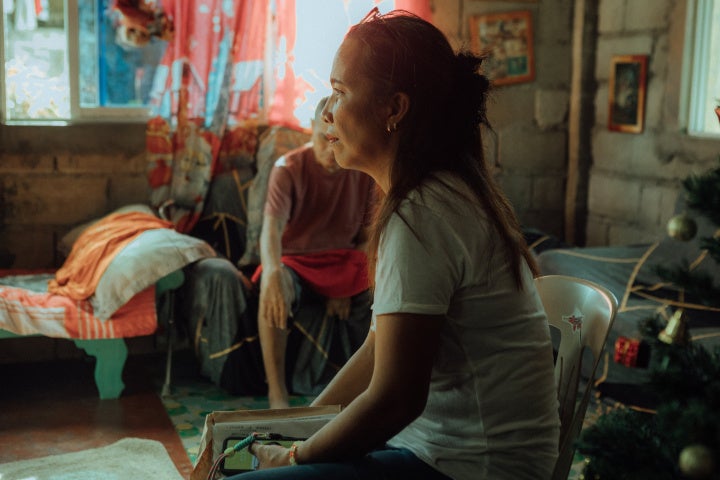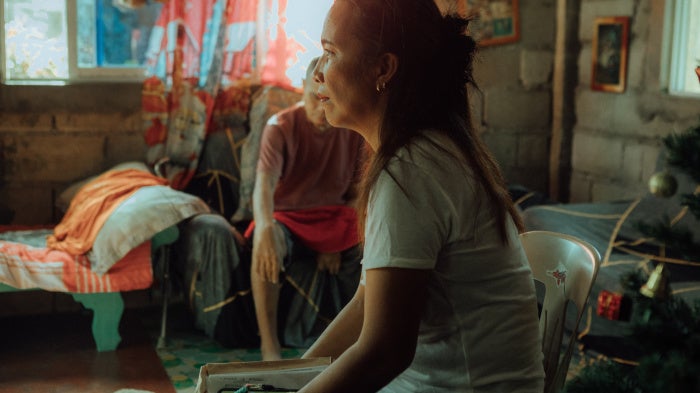After the Storm
A new web feature looks at climate change, planned relocation, and people with disabilities in Siargao, Philippines.


A new web feature looks at climate change, planned relocation, and people with disabilities in Siargao, Philippines.


The 66-page report, “‘There’s Just No More Land’: Community-led Planned Relocation as Last-resort Adaptation to Sea Level Rise in Solomon Islands,” documents why Walande community members made the difficult decision to relocate after decades of adapting to climate change in place, how they moved without adequate government and international assistance, and how their enjoyment of their economic, social, and cultural rights is still threatened. Human Rights Watch found that the Solomon Islands’ government has taken important steps to support communities facing the most acute impacts of the climate crisis, including by adopting Planned Relocation Guidelines, but has not yet fully put them in operation.

The 67-page report, “Poisonous Profit: Lead Waste Mining and Children’s Right to a Healthy Environment in Kabwe, Zambia,” documents the Zambian government’s issuance of mining and processing licenses for South African, Chinese, and local businesses and its failure to intervene against blatant violations of Zambian environmental and mining law by several mining and processing companies.


The 178-page report, “Double Injustice: How Mexico’s Criminal Justice System Fails Victims and the Accused in Homicide Investigations,” examines in detail the reasons for the poor results of Mexico’s criminal justice system in homicide investigations and identifies ways to improve access to justice for victims.

The 85-page report, “‘Forced to Give Up on Their Dreams’: Sexual Violence against Girls in Guatemala,” documents the numerous barriers that girls who are survivors of sexual violence face accessing essential health care, education, social security, and justice. Guatemalan law classifies any sexual activity involving a child under 14 as sexual violence. Guatemala’s National Registry of Persons (RENAP) reported that between 2018 and 2024, 14,696 girls under 14 gave birth and became mothers, in many cases against their will.

The 61-page report, “Kids You Throw Away: New Jersey’s Indiscriminate Prosecution of Children as Adults,” reveals that prosecutors have near-total discretion to decide whether a child is tried as a child or an adult, known as a “waiver decision,” and leads to vastly different outcomes depending on geography and with stark racial disparities. Judges can only intervene if they find that a prosecutor has abused their discretion, a virtually impossible standard to meet. This leaves children vulnerable to arbitrary life-altering decisions, with little to no oversight or recourse.

The 133-page report, “‘The Land of Our People, Forever’: United States Human Rights Violations against the Numu/Nuwu and Newe in the Rush for Lithium,” found that the US Bureau of Land Management permitted the Thacker Pass mine without obtaining the free, prior, and informed consent of Indigenous people—the Numu/Nuwu and Newe, or Northern Paiute and Western Shoshone in English—in violation of their rights to religion, culture, and to their ancestral lands under international human rights law and standards. While there may be others, at least six Tribes have connection to the land at Thacker Pass.

The report, “No Excuse: Inadequate Cervical Cancer Prevention and Care for Black Women in the United States Mississippi Delta,” documents that state and federal policies and a lack of investment in prevention are failing to ensure Black women in the rural Mississippi Delta—a region with some of the worst health indicators and highest rates of poverty in the entire United States—have access to comprehensive, affordable, and equal reproductive healthcare services and information. Mississippi has the highest rate of cervical cancer deaths in the United States and Black women in the state are almost 1.5 times as likely to die of the disease as white women. Black women living in the largely rural Mississippi Delta area in the southern United States have an even greater risk of dying from the disease.

The 50-page report, “‘Five Babies in One Incubator’: Violations of Pregnant Women’s Rights Amid Israel’s Assault on Gaza,” finds that Israeli forces’ unlawful blockade of the Gaza Strip, its severe restrictions on humanitarian aid, and attacks on medical facilities and healthcare personnel have directly harmed women and girls during pregnancy, childbirth, and the postpartum period. The Israeli government, as the occupying power in Gaza, has violated the right to the highest attainable standard of health and other rights of pregnant women and girls, including the right to dignified, respectful health care throughout pregnancy, childbirth, and postpartum, as well as the right to newborn care.

The 50-page report, “After the Monsoon Revolution: A Roadmap to Lasting Security Sector Reform in Bangladesh,” offers recommendations for systemic reform after Prime Minister Sheikh Hasina’s autocratic administration was ousted in August 2024. The report urges the interim government to establish legal detention practices and repeal laws used to target critics. Reforms should be centered on separation of powers and ensuring political neutrality across institutions, including the civil service, police, military, and the judiciary. The government should seek technical assistance, monitoring, and reporting by the Office of the High Commissioner for Human Rights and other UN rights experts to ensure lasting reforms.

In the 179-page report, “Extermination and Acts of Genocide: Israel Deliberately Depriving Palestinians in Gaza of Water,” Human Rights Watch found that Israeli authorities have intentionally deprived Palestinians in Gaza of access to safe water for drinking and sanitation needed for basic human survival. Israeli authorities and forces cut off and later restricted piped water to Gaza; rendered most of Gaza’s water and sanitation infrastructure useless by cutting electricity and restricting fuel; deliberately destroyed and damaged water and sanitation infrastructure and water repair materials; and blocked the entry of critical water supplies.

The 135-page report, “‘We Need to Take Away Children’: Zero Accountability Six Years After ‘Zero Tolerance,’” finds that the government refused, in many cases for days or weeks, to disclose the circumstances and whereabouts of separated children to their parents, which meets the definition of an enforced disappearance. Forcible family separations may also have constituted torture, the intentional infliction of severe suffering for an improper purpose by a state agent. Even a single instance of enforced disappearance or torture is a crime under international law.

The 175-page report, “‘I Learned How to Say No’: Labor Abuses & Sexual Exploitation in Colombian Webcam Studios,” exposes working conditions in webcam studios in Bogotá, Cali, Medellín, and Palmira, where models record content that is broadcasted by adult platforms and streamed around the world. Webcamming is a global industry in which studies estimate that platforms keep between 50 and 65 percent of what viewers pay. People interviewed said that studios retain as much as 70 percent of what is paid out by the platform, reducing the pay of workers. Adult webcam platforms based in the United States and Europe should immediately address labor abuses and sexual exploitation in Colombian webcam studios.

The 48-page report, “‘All She Did Was Help People’: Flawed Anti-Collaboration Legislation in Ukraine,” analyzes Ukraine’s anti-collaboration laws’ impact on rights and their broader consequences on Ukrainian communities during and after Russia’s extremely abusive occupation. While these laws were adopted to deter collaboration with occupying forces, the practical impacts of some aspects of the legislation go much further, Human Rights Watch found. Some provisions do not distinguish between collaboration to undermine state security and situations in which Ukrainian civilians hold public service positions under the occupying authorities so that civilian life can continue or carry out other activities for the benefit of civilians.

The 79-page report, “‘Die First, and I’ll Pay You Later’: Saudi Arabia’s ‘Giga-Projects’ Built on Widespread Labor Abuses,” documents widespread abuses against migrant workers, some of which may amount to situations of forced labor, including exorbitant recruitment fees, rampant wage theft, inadequate protections from extreme heat, restrictions on transferring jobs, and uninvestigated worker deaths. Saudi authorities have systematically failed to prevent or remedy these abuses, including at high-profile projects financed by its sovereign wealth fund, the Public Investment Fund (PIF).
